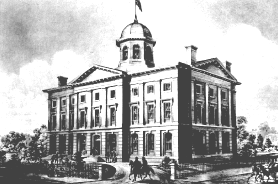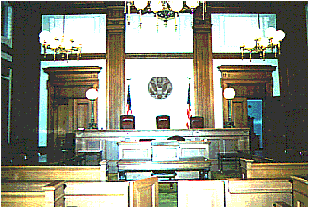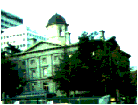 Portland Pioneer Post Office
Portland Pioneer Post Office Portland Pioneer Post Office
Portland Pioneer Post OfficeUnless the architects and engineers examined the original plans for the building and read the correspondences to discover what is inside the walls, or unless they have already been given permission to dig a hole into the wall to find its construction pattern, it is unlikely they could make a clear determination as to the soundness of the original structure. They would also need to know the soundness of the old construction system versus the 20th Century systems. But then digging into the walls would damage the structure anyway.
The historian, John Ferrell, wrote to me some years ago, that the city of Portland is well known for its public transportation. In fact, he says the Mayor uses public transportation. The public transportation in Portland is the best we have ever seen in a city that we have visited. All parts of the city are easily reached with very little required walking between stops for every location we visited. The GSA plan for a parking garage under the Portland building is therefore not necessary even for security for the judges. There are many unused offices in this building since the local Senator moved out and others moved out. This space could be converted into a local postal museum with possibly history of the mint and assay office proposals the government had for the 19th Century. They could sell postal and historic items and coins minted by the government so that the building would not be so empty. Sam Oakland would like to see a Postal Museum that would sell historic postal materials world-wide. There is precedence for this. Washington, DC put a Postal Historical Museum in the Old Post Office next to Union Station. Unfortunately, that one is not very inviting. An elderly friend of mine visited it one day, had trouble finding the museum in the vast building and when she did find it she said the access to it was through a dark hall. However she did visit and did enjoy what she saw. There was little to buy at that time. Portland could do better with theirs when/if they get one. Citizens in Portland are willing to operate it.
There are other Mullett Historic buildings around the country that have
converted the basement areas into a variety of fine uses. Some have put
in cafeterias for the public and some have put in mini museums showing the
historical evolution of a region.
 Judges in Pioneer Courthouse care about history... This judge advertised
to locate the historic desk and chair used in this 1988 photo. The desk
and chair were found several States away. He obtained them and complained
that some who had space in the building did not appreciate its historic
heritage. He was proud to be able to use the historically furnished courtroom.
Judges in Pioneer Courthouse care about history... This judge advertised
to locate the historic desk and chair used in this 1988 photo. The desk
and chair were found several States away. He obtained them and complained
that some who had space in the building did not appreciate its historic
heritage. He was proud to be able to use the historically furnished courtroom.
 Pioneer Courthouse has a cupola with a beautiful view of the city and
some photos next to each window showing the original views from the time
of construction or within 20 or 30 years thereafter.
Pioneer Courthouse has a cupola with a beautiful view of the city and
some photos next to each window showing the original views from the time
of construction or within 20 or 30 years thereafter.
The public uses the Post Office quite frequently and there has been a bulletin board and a display of historic photos of the building in that area. The public should be allowed to keep their post office in its present location since it is the oldest post office in continuous use in the Northwestern United States, or it should become a Post Office Museum that still shows the original formation and use.
Anyone wishing to comment to officials about any of these issues of GSA's plans may call Assistant Commissioner for Portfolio Management at 202-501-0638 in Washington, DC. You may also contact Congressional Representative David Wu or Committee on Public Works and Transportation of the U.S. House of Representatives about the use of the Pioneer Post Office and to request the seismic plans be scrapped permenantly. We have stopped GSA in the 1997, 1998, 1999, 2000, and 2001 fiscal years as there were insufficient funds available for starting new projects on Public Buildings. We can thank the Public's determination to cut the overall budget and deficit for this grace period on potential changes in the Pioneer Courthouse. We need to free up the millions of dollars GSA plans to spend on this project by telling officials we do not want them to spend this money for a project that is so unnecessary and is against the public interests.
 Back toMullett buildings
Back toMullett buildings
Mullett-Smith Press home page.
Copyright Mullett-Smith Press, updated November 2000